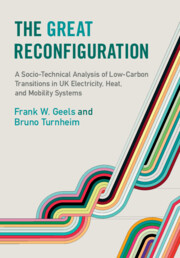Figures
1.1Yearly number of articles in selected UK national newspapers related to climate change
1.5Indexed CO2 developments of major developed economies, 1990–2019
4.1Schematic representation of the material elements and flows in the electricity system
4.2Greenhouse gas emissions from power stations in MtCO2, 1990–2019
4.3Relative contribution of UK electricity industry to Gross Value Added and number of jobs, 1980–2019
4.5UK electricity price index in real terms for industrial and domestic sectors, 1970–2019
4.6Average prices of fuel inputs purchased by the major UK power producers, 1993–2019
4.8UK natural gas production, net imports, and net exports, 1970–2019
4.9UK natural gas consumption by main user categories, 1970–2019
4.10UK market share evolution of energy companies, 2004–2019
4.11Final electricity consumption by different sectors, 1970–2019
4.12Total number of electrical appliances owned by UK households, 2006–2019
4.13UK domestic electricity consumption by appliance category, 1970–2015
4.15Average energy consumption of new cold appliances, 1990–2015
4.16Number of wet appliances owned by UK households, 1970–2015
4.17Number of home computing devices owned by UK households, 1970–2015
4.19Global average levelised costs of electricity for different technologies, 2010–2020
4.20Cumulative and annual installed capacity of UK onshore wind turbines
4.21Cumulative and annual installed capacity of UK offshore wind turbines
4.22Electricity generated from bio-power sub-categories, 1990–2019
4.23Global weighted-average total installed costs of different RETs, 2010–2020
4.24Cumulative UK installed capacity of solar-PV by capacity size, 2010–2020
4.25Number of different kinds of bulbs for non-directional lighting owned by UK households, 2006–2019
4.27Domestic smart meters operated by large suppliers, 2012–2020
4.28Domestic smart meters quarterly installation by large suppliers
4.29Annual number of new R&D and demonstration projects with smart grid technologies in the UK
4.30Number and type of UK battery storage projects larger than 150 kW, 2013–2019
4.31Annual installed capacity (in MW) of UK battery storage projects larger than 150 kW, 2013–2019
5.1Schematic representation of different land-based passenger mobility systems
5.2Schematic representation of the material elements and flows in the automobility system
5.3Domestic passenger mobility (in billion passenger-kilometres) by transport mode, 1952–2019 in Great Britain
5.4Daily use of transport modes (cars, railways, bus) in Great Britain between March 2020 and July 2021 (excluding the Christmas 2020 break); figures are percentages of an equivalent day or week
5.5UK domestic transport-related greenhouse gas emissions, 1990–2019
5.6Length of different road types (in kilometres) in Great Britain, 1923–2019
5.7Motor vehicle traffic (road miles) by road class in Great Britain, 1993–2019
5.8Annual car sales (new registrations) of private and light goods vehicles in Great Britain, 1954–2020
5.10Annual car sales (new registrations) of petrol, diesel, and ‘other’ cars in Great Britain, 2001–2020
5.11Relative cost developments 1997–2019 (1997=100) various motoring costs, bus and rail fares, and cost of living
5.12Passenger car fleet (total number of licensed vehicles) in Great Britain by fuel type, 1994–2020
5.13Sales-weighted average new car fuel consumption in Great Britain, 1997–2019
5.14Passenger cars produced in the UK in millions, 2003–2020
5.15Average distance travelled by car/van for different purposes (miles per person per year, England), 2002–2019
5.17Average per capita passenger travel by cars and light vans in Great Britain, 1971–2019
5.19Length of railway infrastructure and electrified routes (in kilometres) in Great Britain, 1946–2019
5.20Passenger kilometres by rail in Great Britain, 1952–2019
5.21Average distance travelled by railways for different purposes (miles per person per year, England), 2002–2019
5.22Government support to the rail industry, 1985–2019 in £million
5.23Number of English passenger journeys (in millions) on local buses, 1982–2019
5.24Operating revenue (in £millions at current prices) for local bus services in England, 2004–2019
5.25Passenger kilometres by pedal bicycles, Great Britain, 1952–2019, in billion kilometres
5.26Daily use of bicycles in Great Britain between March 2020 and July 2021
5.27Trend in cycle flows (in thousand cycles per day) across central cordon, 1977–2018
5.28Annual electric car sales (new vehicle registrations) in Great Britain in thousands, 2001–2020
5.30Number of public electric vehicle charging devices in the UK
5.31Biofuel use in UK transport, 2004–2019 (excluding aviation), in million tons oil equivalent
5.32Real and adjusted percentage of biofuels in road transport fuel use, 2005–2019
5.33Percentage of working population working ‘at home’ and ‘from home’, 1992–2020
5.34Major occupational groups (from ONS categorisation) in the ‘working at home’ category, 2012–2020
5.35Number of members and number of cars in London car sharing clubs, 2010–2018
5.36Number of licensed London taxis and private hire vehicles (PHVs) and drivers
6.1Schematic representation of the material elements and flows in the dominant UK (domestic) heat system (involving heating and buildings)
6.2UK greenhouse gas emissions (in MtCO2e) from buildings, 1990–2019
6.4Evolution of average gas price (in GPB/GJ) for households in the UK, 1991–2019
6.6Domestic energy consumption for space heating and water heating in kilotons of oil equivalent, 1970–2019
6.8Domestic market gas supply market shares in GB, 2005–2020
6.11Diffusion of different home insulation measures in UK homes, 1976–2018
6.12Total number of UK dwellings (in millions) per tenure category, 1980–2018
6.13Insulation measures in English houses by tenure, 2010 and 2019
6.14Delivery rates of key insulation measures in UK houses, in millions of installations
6.15Number of permanent dwellings completed, by sector, United Kingdom, 1949–2019
6.16Renewable sources to generate heat (all sectors), 1990–2019
6.17Quarterly and cumulative accreditations of low-carbon heating installations under domestic RHI (number of installations)
6.18Variations in domestic RHI subsidy levels between 2015 and 2020 (p/kWh),
6.19Diffusion of solar thermal in the UK, annual installed capacity, in m2
7.1Schematic MLP-representation of electricity system reconfiguration with bold, normal, and dotted lines representing the relative contributions of different innovations to unfolding carbon reductions
7.2Schematic MLP-representation of passenger mobility systems reconfiguration with bold, normal, and dotted lines the relative contributions of different innovations to unfolding carbon reductions
7.3Schematic MLP-representation of heat system reconfiguration with bold, normal, and dotted lines the relative contributions of different innovations to unfolding carbon reductions
7.4Final energy consumption (in million tonnes of oil equivalent) by user category

